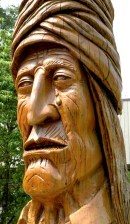Cherokee, home of the Eastern Band of Cherokee Indians, is rich in tribal history and is a must-see when visiting Western North Carolina. An easy drive from Asheville, NC, eastern Tennessee, or north Georgia, the town of Cherokee is a mix of true cultural heritage and pure tourism fun.
Asheville, NC, eastern Tennessee, or north Georgia, the town of Cherokee is a mix of true cultural heritage and pure tourism fun.
To reach Cherokee from Asheville, take I-40 east to the 23/74 turnoff to Waynesville. There are two routes to choose from: the first will be via Lake Junaluska and Maggie Valley on US 19. This is an interesting drive, but takes you over Soco Gap, so be prepared for winding roads. The other alternative is to stay on 23/74 to Sylva, then take US 441 N to Cherokee.
The Southern Appalachian Mountains are the ancestral home of the Cherokee people, whose forebears have lived here for more than 11,000 years. When much of the tribe was removed to Oklahoma on the Trail of Tears in 1838, a handful escaped and remained in the mountains. Others later returned from Oklahoma to their native land.
Learn the fascinating history and experience the culture of the Cherokee people by visiting:
Museum of the Cherokee Indian
A wonderful place to begin your visit, the Museum of the Cherokee Indians is a state-of-the-art museum with exhibits that tell the Cherokee story, from ancient times until today.
Oconoluftee Visitor Center
A living history experience for young and young-at-heart, the Village shows what Cherokee life was like in the 1750s here in the Southern Appalachians. Self-guided tours allow visitors to interact with the craft demonstrators and other villagers in the traditional attire of the era.
Qualla Arts & Crafts
In this museum and sales/showroom you will learn about the ancient Cherokee crafts of basketmaking, pottery, carving and more. Founded in 1946 with the purpose of preserving and advancing Cherokee arts and crafts, the Qualla Arts & Crafts Mutual, Inc., is today the oldest and leading Native American Arts cooperative in the United States.
Unto These Hills Outdoor Drama
One of the longest running outdoor dramas in the U.S. “Unto These Hills” portrays the unique story of the Cherokee from a historical perspective. The newly reconcepted play traces the Cherokee people through the aeons, through the zenith of their power, through the heartbreak of the Trail of Tears, finally ending, appropriately, in the present day.






 Use these buttons to Add, Remove, and Organize your destinations.
Use these buttons to Add, Remove, and Organize your destinations.
